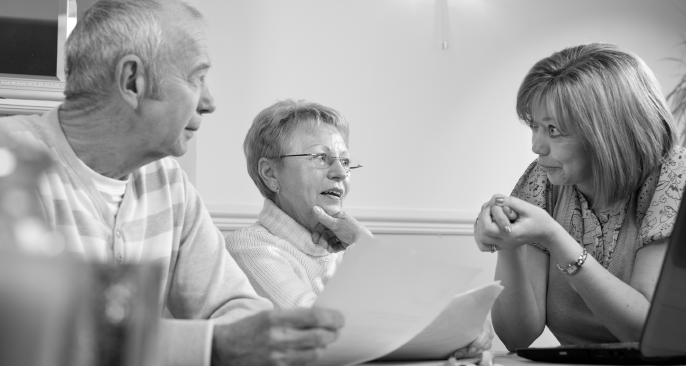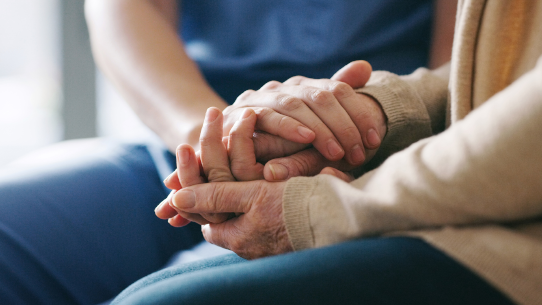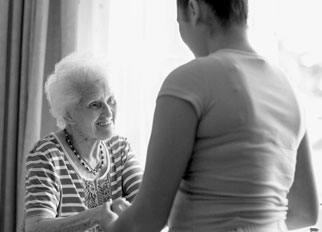Getting help is easy
Whenever you think you might need it
Your senior years are a wonderful time. Still, social isolation, grief after losing close friends, and other factors can affect the way you think and feel. You don’t have to go it alone.
Your health plan includes behavioral health benefits, like counseling and therapy, so you can strengthen your mental health at any age. Best of all, you only pay your plan deductible, copay or coinsurance when you receive care in network. Your plan also offers a variety of resources that are completely free. We provide all the resources you need to maintain your mental well-being.
Crisis assistance
Primary care physician
Your partner in seeking emotional well-being
If you're looking for an easy way to find counseling for older adults in Michigan, make an appointment with your PCP for a list of references. They may also have other options for stress management and maintaining mental well-being.
Don’t have a PCP? You can log in to your Blue Cross member account to find one.
Anxiety is found more often than depression in older adults.¹
Anxiety
Anxiety disorders in older adults are common, affecting 10% to 20% of people.1
-
Persistent sad, anxious or empty mood
-
Feeling restless, nervous or irritable
-
Having a racing or pounding heart
-
Feeling you can't catch your breath
Depression
Studies show that loneliness and social isolation are associated with higher rates of depression in older adults.2
-
Loss of interest in pleasurable activities
-
Feeling hopeless, guilty or worthless
-
Irritability, restlessness or jumpy
-
Moving or talking slower than usual
SELF CARE
Putting your best foot forward
Explore these free services and resources designed to help you be your best self.
-
SilverSneakers® on Facebook Live
Enjoy the excitement of these workouts from home. Classes are live-streamed, making your exercise routine safe for you and your friends.
-
Blue Cross Virtual Well-Being℠
Check out these weekly webinars live on Thursdays or on demand any time for a dose of inspiration. Topics include resiliency, emotional health, mindfulness and much more. Catch live meditation sessions on Wednesdays.
What can you do to reduce stigma

See how you can reduce universal stigma on mental health
Education is always a good place to start when it comes to stigma. Know the facts, and advocate for yourself and others when opportunities come up. Here are a few things to keep in mind:
Be aware of your attitude and behavior. Examine your own judgmental thinking that may have been planted or reinforced by society.
Always put thought into your words. What you say can perpetuate stigma, even if you don’t mean to.
Talk to your friends and family about therapy and be supportive of their decisions to get support.
Coping with loneliness

Finding ways to stay social can help you stay healthy
Social isolation can pose a threat to both physical and mental health for anyone, but especially for seniors. Limited human contact is even linked to many chronic conditions including depression, heart disease and high blood pressure.3 Blue Cross Blue Shield of Michigan believes in the healing power of human connection, even when it may feel tough to do so. Here are a few suggestions for helping to cope with isolation or loneliness.
- Ask about grief support for seniors
- Invite a friend to go on a walk or have a video chat
- Sign up for an online course or enthusiast group
- Try an online group exercise program like SilverSneakers
Caregivers
Being there for a loved one can be very rewarding. Still, studies have shown higher levels of stress in caregivers versus non-caregivers. This stress can lead to anxiety, depression or an increased intake of alcohol or other substances .4
Here are just a few ways you can take care of yourself while looking after a loved one:
- Seek caregiver education
- Join a local support group
- Eat healthy and stay active
- Ask for help when you need it
- Make time for friends and fun
Recommended reading

Self-care guide
Researchers have found that those who engaged in hobbies report lower levels of depression.
Get the guide
Alcohol and depression
Alcohol overuse can lead to a cycle of anxiety and depression.
Get the facts
Inactivity can affect your mood
Symptoms of anxiety and depression have long been linked to inactive lifestyles.
Learn the signs
You've got the most important job in the world. Let us help you through it.
See parent's guide



Good health unites all of us. Get tips for a strong mind-body connection.
See member's guideThe information contained on this webpage is for educational purposes only. Nothing on this webpage is intended to be, nor should be used as or relied upon as, professional medical advice. Nothing contained on this webpage is intended to be used for medical diagnosis or treatment. For medical advice, or to receive medical diagnosis or treatment, consult with your health care provider.
Y0074_MdcrBhrHlth_C 0524
